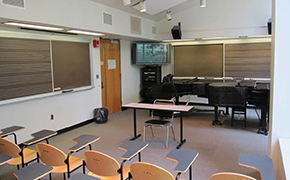Instructor Insights pages are part of the OCW Educator initiative, which seeks to enhance the value of OCW for educators.
Course Overview
This page focuses on the course 21M.295 American Popular Music as it was taught by Teresa Neff in Fall 2014.
This course surveys the development of popular music in the United States during the last two hundred years.
Course Outcomes
Course Goals for Students
This course introduces students to music they have never heard before while also deepening their understanding of the traditions on which the popular music they hear today is built. In addition, it helps students hone their analytical listening skills.
Curriculum Information
Prerequisites
There are no prerequisites for this course.
Requirements Satisfied
HASS-A ![]()
Offered
Offered every other fall semester.
Assessment
The students' grades were based on the following activities:
 20% Two exams
20% Two exams 20% Research essay
20% Research essay 20% Two listening guides and presentations
20% Two listening guides and presentations 30% Final project and presentation
30% Final project and presentation 10% Participation
10% ParticipationInstructor Insights on Assessment
Beyond written papers, presentations, and exams, I find class discussions are an effective way to gage student participation. Discussions can take on many forms including group work, commentary on lyrics or video, or a response to the assigned reading.
Student Information

Breakdown by Year
The majority of students in the class were seniors. There were also some juniors and a few sophomores.
Breakdown by Major
The majority of students were from Engineering fields including Electrical Engineering and Computer Science, Mechanical, and Biological Engineering. There were also a number of Materials Science majors.
During an average week, students were expected to spend 12 hours on the course, roughly divided as follows:
In Class
- Met 2 times per week for 90 minutes per session; 26 sessions total; mandatory attendance.
- Students actively participated during each session, as well as led discussions about specific pieces of assigned music.
Out of Class
- Prepared for in-class discussions, presentations, and exams.
- Researched and prepared written assignments.
- Listened to assigned music.
Semester Breakdown
| WEEK | M | T | W | Th | F |
|---|---|---|---|---|---|
| 1 |  |  |  |  |  |
| 2 |  |  |  |  |  |
| 3 |  |  |  |  |  |
| 4 |  |  |  |  |  |
| 5 |  |  |  |  |  |
| 6 |  |  |  |  |  |
| 7 |  |  |  |  |  |
| 8 |  |  |  |  |  |
| 9 |  |  |  |  |  |
| 10 |  |  |  |  |  |
| 11 |  |  |  |  |  |
| 12 |  |  |  |  |  |
| 13 |  |  |  |  |  |
| 14 |  |  |  |  |  |
| 15 |  |  |  |  |  |
| 16 |  |  |  |  |  |
 No classes throughout MIT
No classes throughout MIT Lecture session
Lecture session Assignment due date
Assignment due date No class session scheduled
No class session scheduled Student Presentations
Student Presentations Exam
Exam

 Room 1 of 1
Room 1 of 1 